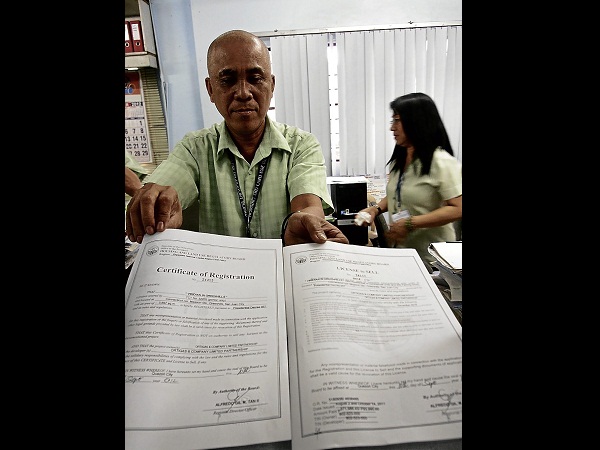
VERIFY before closing the deal. HLURB’s Bebot Piangco of the records department shows samples of License to Sell and Certificate of Registration documents. Photo by Tessa R. Salazar
In 2009, an estimated 85 percent of cases being filed with the Housing and Land Use Regulatory Board legal office involved refunds of installment payments on real estate properties. The refunds of installment payments included subdivision and condominium developments in Metro Manila.
What may have become an all-too-familiar scenario in the HLURB halls have been complainants filing cases against developers who didn’t complete their projects, despite receiving payments even during the pre-selling phase.
HLURB legal officer Mike Denava lamented that prospective buyers should oblige their sales agents (even of reputable developers) to show documents pertaining to the project and the developer before giving the downpayment.
Aside from that, Denava and fellow officers from HLURB advise the following, before buyers commit to pay for properties:
1 Do an honest-to-goodness reality check. Will your resources allow you to maintain a monthly amortization? Look into your source of income, whether you can afford to pay equity and the monthly installments.
“We have seen many cases of overseas workers who bought preselling properties but could no longer maintain the monthly amortization even before the house and lot or condominium was turned over because their contracts abroad were not renewed,” said Denava.
2 Check if the broker/agent is registered with the HLURB and especially ensure that the property being eyed has not been sold to other buyers.
3 Make sure that the developer has a License to Sell for the particular project. Ask the seller or broker/agent of the developer if the project is registered and has a license to sell issued by the HLURB. This can be verified in the HLURB website (www.hlurb.gov.ph).
Runel B. Taningco of HLURB’s Information and Communications Technology Division advised prospective buyers to go over the HLURB list of projects that have failed to show any license to sell and have violations on record. He revealed that most of the entries on the list involved preselling projects.
For the list of the projects in Metro Manila and Rizal that have cease and desist orders, check out https://hlurb.gov.ph/ wp-content/uploads/home/ project%20with%20CDO/ CDOENCR.htm. For nationwide projects outside of Metro Manila and Rizal, check with the HLURB regional operations at https://hlurb.gov.ph/about-us/.
“We try to put everything in the website guidelines. We try to update as frequently as possible. Preselling (violations) should be reported to us. Without reports/complaints, we cannot issue CDOs (cease and desist orders). (Our) regional offices maintain monitoring groups: status of developments of projects that were issued licenses to sell,” explained Taningco.
He added that there have been incidents where buyers did verify preselling projects at HLURB, but only after they had already been paying for the property for more than a year.
Buyers are also advised to read Presidential Decree 957, or the Subdivision and Condominium Buyer’s Protective Decree (as amended by PD 1216). The decree involves regulating the sale of subdivision lots and condominiums, and provides penalties for violations.
An Inquirer Property reader once commented that “no pre-selling should be the rule, unless the project is at least 80 percent complete.” The reader went on to say that “as it is, the delay in the delivery of the units and the documentary proof of ownership is the common practice by most developers.”
4 Personally visit the subdivision/condominium, where the house and lot or condo unit to be purchased is located. Check if the materials of the house or condo unit conform with the development standards and approved construction specifications submitted to HLURB. Check also who would pay the cost of the water and electric meters, the subdivision perimeter fence, and so on. Check also who would eventually operate the subdivision/ condominium’s water system.
5 If the project has a License to Sell, you may already enter into a contract to sell with the owner/developer. However, there are things which must be checked before signing the contract:
• The date of completion of the project as indicated in the License to Sell;
• If the property is mortgaged from the HLURB;
• The facilities and amenities represented in the advertisement flyers/brochures are in accordance with the approved subdivision and condominium plan on file with HLURB.
6 Before signing the Contract to Sell:
• Don’t sign any blank form of the CTS.
• Read thoroughly all the contents of the CTS, especially the terms and conditions in fine print.
• Secure a copy of the CTS and all other documents that you signed.
• Make sure that the CTS would be registered by the owner/developer to the Register of Deeds.
• Pay directly to the owner/developer or the marketing agent authorized by said owner/developer;
• Ask official receipts on all payments for your file.

